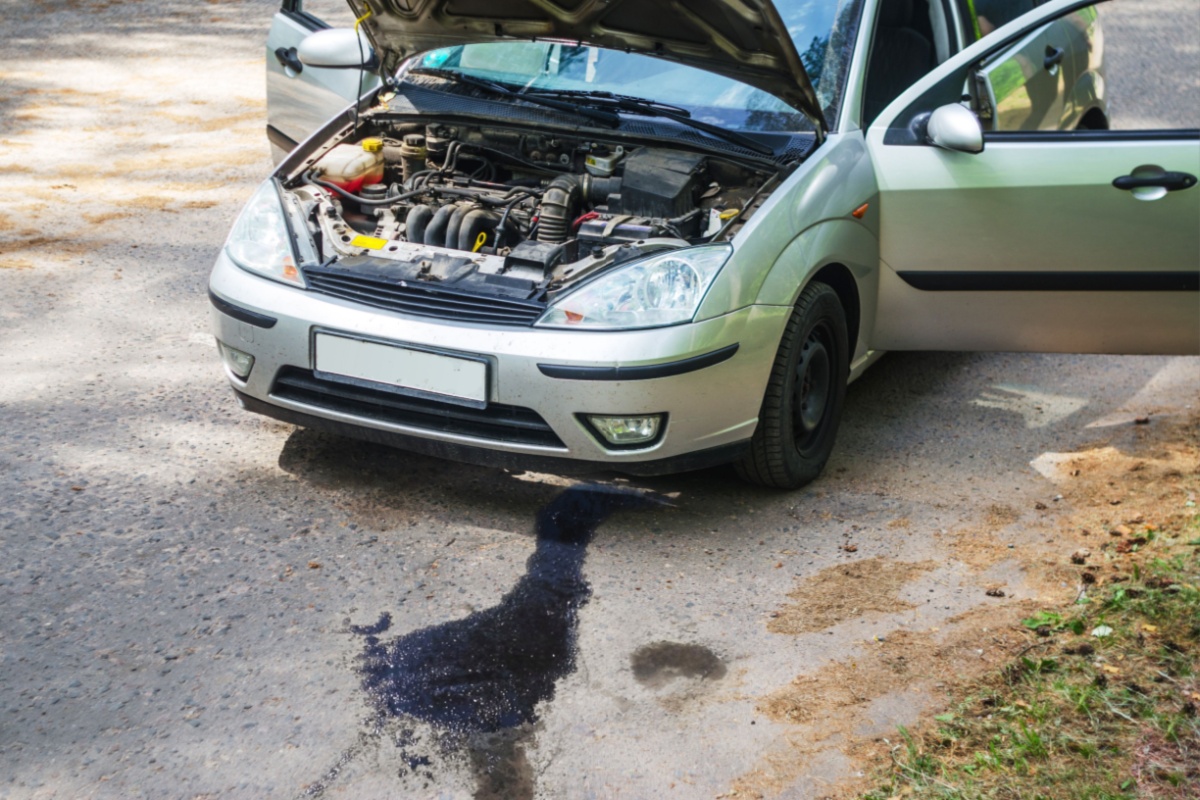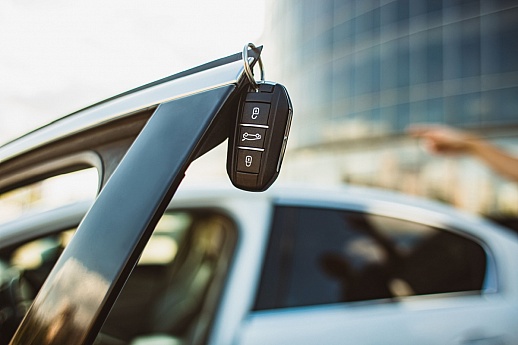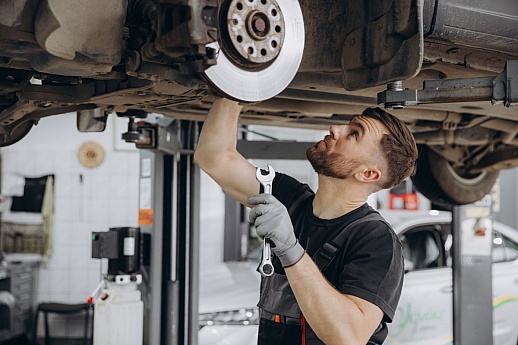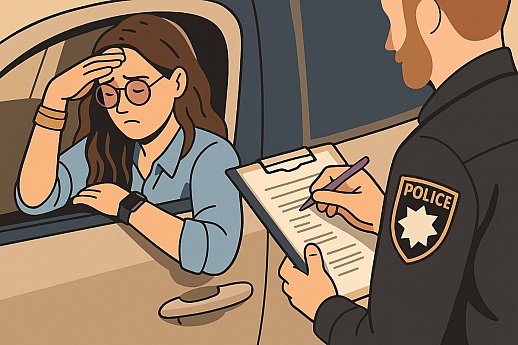Why is My Car Leaking Oil? How to Fix It
Noticing oil stains in your driveway or an oily smell coming from under the hood can be a little nerve-wracking. If you’re not familiar with car maintenance, you might wonder: why is my car leaking oil, and what can I do about it?
Don’t worry — oil leaks are a common issue, and in many cases, they’re easier to handle than you think. In this guide, we’ll cover the most common reasons for oil leaks and how much it costs to fix them before they turn into bigger issues.*
What Causes Oil Leaks: 9 Reasons
There are several reasons why oil might be leaking from your car. Let’s break down the top nine causes to help you identify the issues faster.

1. Worn-out Gaskets
When you’re questioning “why is my car leaking oil?", start by inspecting the gaskets.
Gaskets are seals in your engine that prevent oil from leaking out. Over time, they can wear down due to heat, pressure, or simply age.
When a gasket starts to crack or lose its shape, it creates small gaps. These gaps allow oil to seep through.
The good news? Replacing a gasket is a routine job for a mechanic and doesn’t take much time and effort. Costs can vary by type of gasket, and you can expect to spend anywhere from $100 to $300 for a simple replacement.
2. Loose or Damaged Oil Pan
If you see oil pooling under your car, especially toward the middle, the culprit may be the oil pan.
The oil pan sits at the bottom of your engine and holds the oil that keeps everything lubricated. It can become damaged by road debris or even get knocked loose over time.
Sometimes, the fix is as simple as having a mechanic tighten the bolts with a socket wrench. But if the pan is cracked or dented, it may need to be replaced.
Replacing or repairing an oil pan can cost anywhere from $50 to $1,000.
3. Loose or Damaged Drain Plug
The oil drain plug is located at the bottom of your oil pan. When changing the oil, the plug is removed to drain out the old oil.
If the plug isn’t properly tightened after an oil change, or if it is worn or damaged, oil can slowly seep out and leave spots under your car.
In this case, a mechanic can simply tighten the plug to stop the leak. Some won’t even charge you for this service.
Replacing the drain plug can cost between $10 and $30. However, if the oil pan threads are stripped, a mechanic will need to install a thread repair kit, which can cost upwards of $150.
4. Faulty Oil Filter
The oil filter is another potential cause to consider when wondering ‘why is my car leaking oil?.’ Your oil filter is designed to trap dirt and particles and keep your engine oil clean. However, if the filter is damaged, old, or incorrectly installed, it can become a source of leaks.
Oil might escape where the filter meets the engine or through cracks in the filter itself.
To avoid this, replace your oil filter whenever you get an oil change. This is standard practice during a professional oil change.
Some vehicles require oil changes every 3,000 miles, while others can go up to 10,000 or more. You will find the manufacturer’s recommended oil change intervals in your vehicle’s owner's manual.
Replacing a faulty oil filter costs as much as an oil change, as your oil filter is replaced during the oil change process. A standard oil change is usually between $35 to $75. However, if you just want to replace the part, it can cost between $5 and $15.
5. Overfilled Oil
Believe it or not, too much oil can cause leaks.
When you overfill your car with oil, it creates extra pressure inside the engine. This pushes oil past seals and gaskets, which leads to oil leaking from the car.
To make sure you’re not overfilling, check your vehicle’s manual for the correct oil level and use the dipstick.
If you have a high reading on your dipstick, take your car to the mechanic to drain the excess. Consider doing it as soon as possible to prevent damage.
A mechanic may charge between $20 and $50 for this service.
6. Worn-Out Oil Seals
If your car is leaking oil from the front or back of the engine bay, you may be dealing with a worn-out seal.
Oil seals are small parts that prevent oil from escaping around rotating components like the crankshaft or camshaft.
Heat and age can make these seals brittle over time, causing them to shrink or crack. When this happens, oil can leak from the front or rear of the engine. So if you find yourself wondering "why is my car leaking oil?," worn-out seals could be to blame.
It can take up to several hours for a mechanic to access the seal, which makes this an expensive fix. You should expect to spend around $100 to $1,500 for this service, depending on which seal needs to be replaced.
7. Faulty Oil Pressure Sensor
If you notice your car leaking oil when parked, a faulty sensor could be the cause. This sensor is responsible for monitoring your engine’s oil pressure.
It is located on the cylinder head or engine block and can crack or fail due to heat and vibration, leading to leaks.
You might also experience inaccurate oil pressure readings or a flickering oil warning light on your dashboard.
Luckily, replacing the sensor is a quick and inexpensive fix. You will likely pay between $70 to $200.
8. Broken Oil Filler Cap
Sometimes, the smallest parts can cause oil leakage from the car. If you notice leaks near the top of the engine, you may have a broken oil filler cap.
The oil filler cap is designed to form a tight seal after you add oil to the engine. If the cap is loose, cracked, or missing its gasket, oil can escape while you’re driving.
To fix a broken cap and stop the leak, simply replace it with a new one. Just make sure you buy the correct cap for your car model that fits properly.
You will likely pay $5 to $20 for a replacement cap, and you shouldn’t need to pay any fees for labor, as it is very easy to screw in the new cap.
9. Incompatible Oil Type
Each vehicle is designed to run best with a specific type of oil.
Using oil that’s too thin for your engine may cause leaks because it doesn’t seal well around the gaskets.
On the other hand, oil that’s too thick can increase pressure and force oil out through small openings.
Always check your vehicle’s manual for the recommended oil type.
Fixing this issue may only require a simple oil drain and replacement, which would be a standard oil change fee of $35 to $75. However, you may also need an engine flush or even engine repairs, which can cost anywhere from $100 to $5,000 or more.
Where is My Car Leaking Oil From?
If you find oil under your car, there are several areas where leaks can happen. Here are the most common spots to check:
- Front of the car: Leaks near the front could be caused by worn seals or the front crankshaft.
- Engine block: Oil on the engine itself could come from the valve cover gaskets, oil filters, or oil pan gaskets.
- Underneath the car: Oil leaking from under the car might come from a loose drain plug, a damaged oil pan, or a worn-out seal.
- Top of the engine: A loose or damaged oil filler cap located at the top of the engine can lead to oil leaking from the engine, causing spills or leaks while driving.
- Side of the engine block: Cracks and wear on the oil pressure sensor can cause oil spots under your car and the side of the engine block.
Is it Safe to Drive My Car With an Oil Leak?
No matter the circumstances, you should avoid driving with oil leaking from the engine, even a small one. You may initially think it is harmless, but ignoring it can be extremely risky.
If you keep driving with a leak, your oil levels will gradually drop. Low oil causes engine parts to overheat, leading to increased friction, wear, and engine failure. In the end, you may find yourself paying for costly repairs. While some of the best car insurance companies offer coverage for accidents, they may not cover damages from oil leaks.
But that’s not all. In some cases, leaking oil can drip onto hot engine components like the exhaust manifold. This can be a fire hazard. Although rare, it’s not worth the risk.
Driving with an oil leak is also harmful to the environment. When the oil drips onto the road and driveways, it can wash into storm drains, polluting water sources.
Even a small engine oil leak can form a thin layer on the water's surface and block oxygen from reaching aquatic life. This harms fish, plants, and other wildlife that depend on clean water to survive.
In many regions, allowing oil to contaminate the environment can result in legal penalties and fines. Properly addressing oil leaks is essential not only for environmental protection but also for complying with local laws and regulations.
How to Stop Oil Leaks: Prevention and Repair Tips
Preventing and dealing with oil leaks quickly can save you from expensive repairs. To keep your car running smoothly, consider the following tips.
Stick to a Regular Oil Change Schedule
Regular oil changes are one of the easiest ways to prevent leaks.
As engine oil breaks down over time, it doesn’t lubricate well, which stresses seals and gaskets and leads them to weaken and crack.
Fresh oil keeps these parts in good condition and reduces the chances of leaks. So, make sure you follow your car’s recommended oil change intervals.
Regular oil changes also ensure your engine runs efficiently, helping you save gas while driving.
Use the Correct Oil for Your Car
Even with regular oil changes, you need to use the correct type of oil because cars have different oil needs based on their design.
Using the wrong oil can lead to excessive pressure and cause oil to seep past seals and gaskets. Also, as we said earlier, it can lead to engine damage that can cost thousands of dollars to repair.
So, check your owner’s manual to find the right viscosity and type for your vehicle. It can be conventional, synthetic, or a blend.
Check for Loose Components
Loose parts, like oil filters, drain plugs, or oil pans, are among the most common causes of oil leaks. A mechanic can check and tighten these components.
Inspect and Replace Worn-Out Seals and Gaskets
If you’ve spotted a leak, it could be caused by either a gasket or seal. The most common culprits are the valve cover gaskets, oil pan gaskets, and crankshaft seals. A mechanic should be able to confirm this quickly.
These parts can wear out over time, but replacing them is relatively cheaper than other repairs and can stop the leak before it causes more damage.
Consider Using an Oil Stop Leak Additive
An oil stop leak additive is a temporary fix. These additives soften and expand old seals to help close minor leaks.
Be sure to consult with a mechanic before using an additive. They can let you know if it’s appropriate for your vehicle.
Relying on additives too often can cause buildup in the engine and reduce performance.
Conclusion
Now that you understand the common reasons behind the question “why is my car leaking oil?” along with the areas to check and the potential repair costs, you can keep your vehicle running smoothly and avoid costly repairs. The key is to catch the leaks early and have them fixed promptly to keep your vehicle in top condition. A little care goes a long way.
*Please note that the information presented in this article is for informational purposes only and should not be considered professional advice. Attempting to diagnose or repair oil leaks without proper training can be dangerous and may result in personal injury or vehicle damage. Additionally, unauthorized repairs might void your vehicle's warranty or violate local laws. We recommend consulting a certified mechanic for accurate diagnostics, repairs, and cost assessments. Additionally, always comply with local environmental regulations and legal responsibilities related to vehicle maintenance and the disposal of hazardous ma



